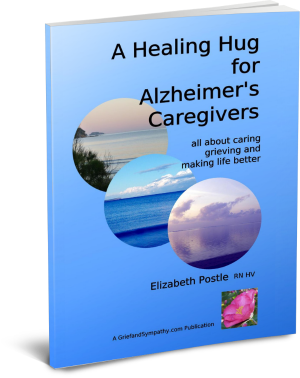7 Home Care Tips for Alzheimer's Caregivers
With the tips for Alzheimer's caregivers on these pages home care should be manageable with support from local services, friends and family at least in the early stages of the disease.
Families can cope with early Alzheimer's signs and symptoms at home for many years with psychiatric care teams giving help and support. As long as clothes are put out and food prepared for them, many dementia patients can cope with feeding and dressing themselves for many years.

1. Get access to Alzheimer's Caregiver support in your area
When a loved one is diagnosed with dementia they are usually referred to the community psychiatric team. They have social workers and nurses working with the consultant.
They do a home visit to check that the home is suitable for the caregiver. They also check that the carer is well enough to cope with the care. They provide advice and support. They usually give regular home visits to check on how things are progressing.
They will also leave telephone numbers for emergencies.
They have lists of groups or clubs available in the area. Your family doctor should have lists of support groups and day clubs in his surgery.
No carer should ever feel that they are coping alone. There is help out there. If you have been inadvertently overlooked ask your doctor for the information.
2. Get Organised
Alzheimer’s home care needs a lot of organisation
A great friend developed Alzheimer’s at only 42 years old. She coped at home for several years. Her husband used to leave messages on the fridge reminding her to eat the sandwiches at lunchtime while he was at work.
Other things may help such as:
- laying out clothes in the morning
- writing a list of things for the loved one to do while you're not there
- writing the plans for the week on a calendar
- prepare food and drinks in advance
- arrange for someone to pop in to keep an eye
My friend's husband had to hide the car keys eventually when she wasn’t allowed to drive. The loved ones can’t accept that they are incapable of driving and blame their partner. They might accuse them of telling tales about them.
This is the early stage of having to accept they might have a problem. It is very difficult to face.
But, it is a slow on-going process and you and your loved one can have many happy times during these years. During the early stages friends and family may not even realise that anything is wrong as many of the early signs of Alzheimer's disease are also typical of simple old age.
3. Get help to deal with wandering
Home care becomes difficult when your loved one with Alzheimer’s starts wandering.
One of the major problems that families can face and which bring them to crisis point are the loved ones wandering away from home and getting lost.
Sometimes police may have to help in the search. Tracer anklets can now be used to find Alzheimer’s patients who roam. The police are happy to supply these.
It might be a way of caring for the loved one at home for longer if this is the only cause for concern. Extra locks on garden gates and doors may help too.
Another major cause for concern and which can bring families to breaking point is the loved one wandering the house at night time. It is a huge stress for carers as they need their sleep in order to cope in the day time. This can be a major cause of families needing to accept sheltered accommodation. They should not feel guilty as no one can work seven days and seven nights.

4. Tips on Home Safety for Alzheimer's Caregivers
As symptoms progress, your loved one needs to be in a safer environment. You may be able to do this at home by carrying out adaptations or keeping your loved one out of certain rooms. Remember to hide things like ladders and knives. Imagine that you are child-proofing your home, but for an adult sized person.
To begin with, locks which are tricky to open, safety switches and other simple adaptations may be all that is needed. Temperature regulators for hot taps, and fire guards are other safety aids to consider.
But when the sense of self safety is gone it is difficult to give the care needed at home. Your safety as well as that of the person with Alzheimer's is at risk. They may touch hot kettles and irons, or attempt to move hot pans from the cooker top. They might leave cooker rings turned on. You can get locks for kitchen cupboards, and many other safety devices from disability suppliers.
Otherwise, you will need help to make sure that they are supervised at all times.
5. Tips on problems with aggression
The worst problem for the caring family is when their beloved parent or partner becomes aggressive. If you think of the tantrums of the toddler who has difficulties with controlling their volatile emotions, the same thing is happening here.
It can sometimes be managed by taking their mind off what is upsetting them. Perhaps suggest a walk or a drink or their favourite fruit, or chocolate.
Sometimes the problem can be a simple one that they want to go to the toilet and can't think what to do. That is something else that the carer has to remind them to do. They have very similar behaviour patterns to a toddler in some respects.
However with a large adult male or physically fit adult lady aggressive behaviour can be very difficult to control and frightening for the caregiver. They then need more expert help from psychiatric teams and emergency calls are often needed.
Again don't feel a failure or guilty. These are patterns of behaviour common with some people with Alzheimer's.
6. THE most important tip for Alzheimer's caregivers - Be Kind to YOURSELF!
If you have cared for someone at home with this illness then you have done a wonderful job. If you are still caring for someone, you are amazing and need all the help you can get from family, friends and the care teams. Ask, ask, ask.
If you don't look after yourself too, you won't be able to help your loved one. You are the most important person in this situation.
Many people can't manage home care as you are doing. Do realise that the time will come when it is too much and extra care is required. Congratulate yourself for all the time you did cope.
Visiting when your loved one is in residential care
This can be much better quality time than you had before, now that you are not 100% responsible for their care and can just concentrate on chatting to them, or perhaps playing a game, or sharing some meaningful photos and memories. You can get some more ideas on activities for visits here.
If you find it very difficult to visit, don't feel guilty. Many people find it very hard to visit their loved ones with Alzheimer's as it can be so distressing to see them so changed. The person they loved isn't there anymore, and they may not even recognise you. This can be very upsetting. Some members of the family always want to visit and check on their relatives and others find it very difficult. These are all normal reactions.
Have a read of this diary of a carer who has experienced this. He still manages to find some joy and a sense of humour even in the hardest of times. Click here to read his 'Dementia and the Tummy Conscience'. Maybe even write a journal yourself, it is a great way of coping with the grief of caring for someone with dementia.
7. Realise that you are grieving
Grief is normal when you are caring for a loved one with Alzheimer's. The person you know and love is disappearing while at the same time you still have to cope with the difficulties of their changed behaviour and personality. People don't realise that you are grieving for the person they once were. You might experience denial, anger, frustration, deep sadness and anxiety.
All of these reactions are normal. Read our page on Alzheimer's Spouse Grief for more information.
To learn more:
"A Healing Hug for Alzheimer's Caregivers: all about caring, grieving and making life better"
If you're feeling frazzled, depressed and unable to cope, my book will enable you to take control, to cope with difficult situations with patience and humour, and to get some relief from the feelings of grief. Soon you will be able to shake off any feelings of guilt and be proud of the way you are coping. Learn more about the book here.
Related Pages:
Understanding Alzheimer's Behaviour Changes
- Grief and Sympathy Home
- Alzheimer's Spouse Grief
- Tips for Alzheimer's Caregivers
Where to get help:
Have You Considered One-on-One Online Grief Counseling?
Get Expert and Effective Help in the Comfort of Your Own Home
The following information about online counseling is sponsored by 'Betterhelp' but all the opinions are our own. To be upfront, we do receive a commission when you sign up with 'Betterhelp', but we have total faith in their expertise and would never recommend something we didn't completely approve.
Do you feel alone and sad with no support and no idea how to move forward? It can be tough when you are stuck in grief to find the motivation to get the most out of your precious life.
Online counseling can help by giving you that support so you don't feel so alone. You can have someone to talk to anytime you like, a kind and understanding person who will help you to find meaning in life again, to treasure the memories of your loved one without being overwhelmed and to enjoy your activities, family and friends again.
- Simply fill out the online questionnaire and you will be assigned the expert grief counselor most suitable for you. It only takes a few minutes and you don't even have to use your name.
- Pay an affordable FLAT FEE FOR UNLIMITED SESSIONS.
- Contact your counselor whenever you like by chat, messaging, video or phone.
- You can change counselor at any time if you wish.
- Click here to find out more and get started immediately.
- Or read more about how online counseling works here.
Sales from our pages result in a small commission to us which helps us to continue our work supporting the grieving.
Hypnosis for Grief - 10 Ways It Can Help You
Try a gentle hypnotherapy track to relax the mind. Learn how self-hypnosis can help you cope with grief at any time of the day or night.






